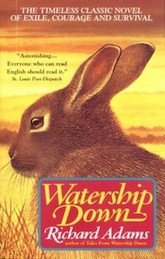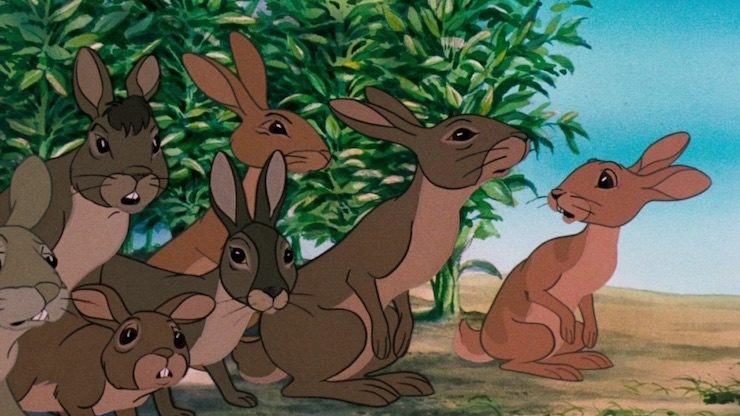Before I read Watership Down, I knew personally how utterly alien animals were, but I had no idea anyone else could quantify it. You know that moment when a friend voices an opinion you’ve been certain was uniquely and utterly your own and you leap out of your seat shrieking HOLY SHITSNACKS, ME TOO and startle the cat? It was that moment, in novel format.
I grew up in the woods a nerdy, semi-feral only child, and for most of my formative years my closest companions were animals. I understood how different their thought patterns were, their reactions to our shared world and how they navigated it. Animals were never just furry little people to me. They were inscrutable, weird, and utterly Other. A preschool “likes/dislikes” list of photographs clipped from magazines gets my opinion across pretty broadly: Comedians and dinosaurs were good, atomic mushroom clouds & cats dressed as people were bad. Something about the act of putting human clothes on an animal unsettled me to my five-year old core. it was an inversion of something better left alone, a violation, an act of cruel disrespect. It still kinda bugs me, honestly.
So I knew animals, and I knew that they were Not Like Us on a bone-deep level. I also read voraciously, and most of the books I picked up were about courageous animals, wilderness adventure, historical wilderness adventure, or historical wilderness adventure with courageous animals. They were great books, and I loved them and would read them until the covers fell off. I still have my childhood copies of Charlotte’s Web, The Jungle Books, Rascal, White Fang, and everything Albert Payson Terhune ever breathlessly wrote about collies. There was something missing from all of them, though. Some deeper understanding of the far gulf between the way a fox sees the world—or a pigeon, or an ant—and how we perceive it. They were obviously all written from the point of view of a human, seeing things as a human would presume a wolf or bobcat would. There was a level of uncanniness no-one could seem to grasp.
All writers bring parts of themselves to their work, and nobody can really know how an animal sees the world or get it across in a literal way you’d actually want to read 400 pages of. Anthropomorphism is always necessary, to a certain degree. But I think I wanted an author to lose themselves enough for shit to get a little weird, at least. I wanted an animal’s viewpoint to feel alien, slightly unsettling, almost unrecognizable but still firmly planted in the laws of the natural world.
(It’s a funny thing. Other writers of genre came to science fiction through tales of literal aliens and other worlds. All I wanted was stories about the otherworldly aliens that shared the world around us.)
The first piece of media I ever found that scratched that itch wasn’t actually a book. It was a game for the Sega Genesis, Ecco the Dolphin, a bizarre side-scroller where you navigated the ocean from pole to pole looking for your stolen pod. Cetaceans (or ‘Singers’ as they call themselves in the game) speak through sonar and song and haiku-like verse. They have their own names for everything. The only sign that humanity has ever existed in the game’s world are the underwater ruins of Atlantis, and there are hints that even they might not have been human. Mankind is never mentioned by any name. It was weird and wonderful and left me completely unsettled every time I played it. Wow, I very clearly remember thinking. I really wish there was a book that made me feel the way this game does.
Three years later, I came across a copy of Watership Down at a junior high book fair. Somehow, despite the fact that I had haunted both school & public libraries obsessively since I was six and usually read everything five years before it was assigned in class, I had never even heard of the novel. Nobody had recommended it; it had appeared on no reading list or Scholastic catalogue. You can chalk that up to the backwater town I grew up in, or the fact that the nearest bookstore was thirty miles away. Whatever the reason, I picked it up utterly unspoiled. There was a rabbit on the cover, the back copy was oblique enough to be intriguing, and a flip through showed that the writing was that midcentury British storytelling voice I always dug when I was lucky to come across it. I took a chance and bought it with my allowance.
 And it proceeded to blow my mind right outta my 13-year old ears. I have no idea what kind of freaky warlock magic Richard Adams was in possession of to make the rabbits have a beautifully detailed society with myths and folklore and personality and STILL make their entire world feel alien and other while STILL making them feel like real beasties, but he was a high-level mage at it. I had never read anything that fit the contours of my brain and what I was hungry for as a reader so well. All of us have that craving: We know what our hearts and minds want to feed on, and when we find That Book, there’s nothing like the comfort and satisfaction of finally settling in and feeling that sense of connection. The best books come from writers trying to pen their own recipes to fill that hunger, I think. Always write what you want to read; I guarantee there are people out there with the same set of tastes dying for a sip, no matter how unusual they may feel to you.
And it proceeded to blow my mind right outta my 13-year old ears. I have no idea what kind of freaky warlock magic Richard Adams was in possession of to make the rabbits have a beautifully detailed society with myths and folklore and personality and STILL make their entire world feel alien and other while STILL making them feel like real beasties, but he was a high-level mage at it. I had never read anything that fit the contours of my brain and what I was hungry for as a reader so well. All of us have that craving: We know what our hearts and minds want to feed on, and when we find That Book, there’s nothing like the comfort and satisfaction of finally settling in and feeling that sense of connection. The best books come from writers trying to pen their own recipes to fill that hunger, I think. Always write what you want to read; I guarantee there are people out there with the same set of tastes dying for a sip, no matter how unusual they may feel to you.
Knowing you’re not alone in how you see the world is always a trip, the closest thing to telekinesis we’ve got. Watership Down (and later, The Plague Dogs) didn’t inspire me to start writing—it was many, many years before I could finally convince myself that the idea of me writing prose wasn’t an embarrassing joke—but it showed me that what I wanted in a story could be done. The itch could be scratched.
Write weird stuff, my friends. Weird the unclassifiable, the unsettling, and the unsellable. Nothing’s sure in this world, but maybe you’ll author the gonzo genre-bending narrative somebody’s desperately searching for.
 Brooke Bolander writes weird things of indeterminate genre, most of them leaning rather heavily towards fantasy or general all-around weirdness. She attended the University of Leicester 2004-2007 studying History and Archaeology and is an alum of the 2011 Clarion Writers’ Workshop at UCSD. Her stories have been featured in Lightspeed, Strange Horizons, Nightmare, Uncanny, and various other fine purveyors of the fantastic. She has been a finalist for the Nebula, the Hugo, the Locus, and the Theodore Sturgeon awards, much to her unending bafflement. The Only Harmless Great Thing is her first project with Tor.com.
Brooke Bolander writes weird things of indeterminate genre, most of them leaning rather heavily towards fantasy or general all-around weirdness. She attended the University of Leicester 2004-2007 studying History and Archaeology and is an alum of the 2011 Clarion Writers’ Workshop at UCSD. Her stories have been featured in Lightspeed, Strange Horizons, Nightmare, Uncanny, and various other fine purveyors of the fantastic. She has been a finalist for the Nebula, the Hugo, the Locus, and the Theodore Sturgeon awards, much to her unending bafflement. The Only Harmless Great Thing is her first project with Tor.com.











The first image there is from the movie, which was fairly true to the book, and thus traumatized many kids. I loved it. I’d already read the book many times by then.
I suspect strongly that the author of the article would enjoy John Crowley’s brand-new fantasy novel, Ka: Dar Oakley in the Ruin of Ymr, the protagonist of which is a crow and which explores deeply the “mental universe” of crows.
I will blow your mind:
Compare the plot of Watership Down to The Matrix.
I found Richard Adams’ The Unbroken Web (aka The Iron Wolf) even more inspiring in some ways!
In it he explores the role of the story teller in a written world. In the book each of the classic stories from around the world are framed in a “live” setting to make them seem more organic like an oral tradition caught for a moment in amber but still capable of growing and changing.
Also, in Plague Dogs the Todd (Fox)’s mind is both alien to us and alien to the dog protagonists. In a way this highlights the alien nature of the dog’s minds.
I loved Watership Down. A book that affected me in a similar way was Duncton Wood by William Horwood – the first in the series. If you haven’t read it yet I highly recommend it.
If you like William Horwood I’d also recommend his book Skallagrigg, not animals but people living with disabilities. Wonderful.
I read many of the Duncton Wood series but it all became a bit much. The first is special.
My brother Vincenzo gave a copy of Watership Down to a girl he was casually dating. She started reading it, turned to my brother, and said, “What’s up with this book? It’s about rabbits!”
His response? “This relationship’s just not going to work out.”
I discovered Watership Down shortly after the paperback was published, and read it avidly, and re-read it often. May I suggest that you get the audiobook version from Audible and listen to it; the late Ralph Cosham does an amazing job of narrating the book.
It always struck me as odd that Watership Down is considered fantasy, since Fiver’s powers are the only remotely magical aspect of it. But Adams builds a world as rich (and alien) as any fantasist, putting the reader off-balance in a wonderfully fantasy way. Assuming that reader isn’t a rabbit, I suppose.
I felt that way about the book, The Fox and the Hound. It in no way resembles the movie.
Good article! Watership Down is a fine novel that explores, among other things, the nature of leadership. Something we (ex)military men can readily appreciate.